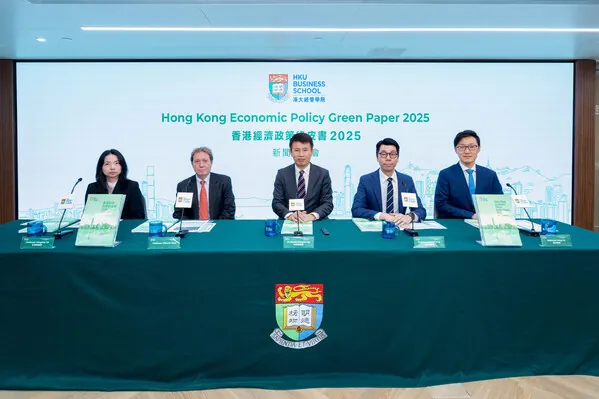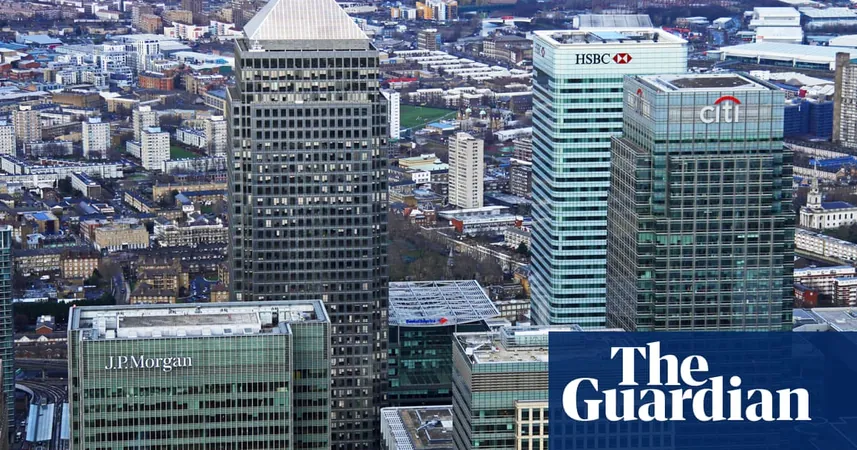
Unleashing Hong Kong's Economic Potential: Key Recommendations from the 2025 Economic Policy Green Paper
2025-01-10
Author: Ting
**HONG KONG, Jan. 10, 2025** — In an ambitious stride towards revitalizing the city’s economy, the HKU Business School has launched the "Hong Kong Economic Policy Green Paper 2025." This pivotal document captures a comprehensive analysis of multiple economic aspects impacting Hong Kong, ranging from fiscal deficits to the burgeoning startup culture, amidst the complexities of global supply chains and climate change challenges.
This year's Green Paper marks the fourth collaboration between HKU and a series of esteemed scholars dedicated to reimagining Hong Kong’s economic landscape. The work undertaken reflects a collective effort to steer innovative policy recommendations aimed at ensuring a stable, energetic, and sustainable future for the city.
Enhancing Fiscal Stability
Professor Hongbin Cai, Dean of HKU Business School, emphasizes the urgent need for policy adjustments to address the rising fiscal deficits that have reached alarming levels, positioning Hong Kong alongside other developed economies. “The heavy reliance on land revenue exposes us to financial volatility, underlining the critical need for diversified income sources and proactive fiscal management strategies,” he notes. The Paper suggests harnessing the government bond program to raise funds for essential infrastructure investments, aiming to sustain fiscal health for the long term.
Reviving the Stock Market
The document reveals escalating concerns about the local stock market, plagued by liquidity issues and an ongoing decline in IPO activities. These challenges have deterred foreign investment and trust in the market. The Green Paper proposes a multi-faceted approach to restore market confidence: attracting investors from emerging markets, adjusting regulatory frameworks, and facilitating innovative tech listings on the Hong Kong Stock Exchange.
Transforming the Startup Ecosystem
Among its groundbreaking insights, the Green Paper highlights the critical "Valley of Death" scenario faced by startups in Hong Kong. Professors Alberto Moel and Alan Kwan stress the need for enhanced collaboration between academia and industry, stating that initiatives aimed at bridging these gaps could catalyze Hong Kong's innovation landscape. Developing partnerships and focusing on resource allocation are essential steps to nurture startups from concept to market.
Reforming the MPF System
The underperformance of the Mandatory Provident Fund (MPF) has continued to frustrate many citizens. The Green Paper identifies key issues such as high fees and conservative asset allocations. “With the impending launch of an e-MPF platform,” states Professor Mingzhu Tai, “there exists a unique opportunity to overhaul the MPF system and enhance financial inclusion across the region.
Addressing Housing Affordability
Hong Kong consistently ranks as the world's least affordable housing market, presenting significant challenges for its residents. The Green Paper advocates for ambitious urban development policies and a strategic shift towards high-quality ownership housing to combat this housing crisis while ensuring equitable access for all.
Navigating Global Supply Chains
Reflecting on Hong Kong's historical role as a trade hub, Professor Heiwai Tang elaborates on the necessity of redefining the city’s strategic position within the evolving landscape of global supply chains. Emphasizing agility and innovation, the Paper outlines ways for Hong Kong to emerge as a pivotal gateway to both mainland China and other emerging markets across Asia.
The Role of AI and Climate Change
As Hong Kong moves into an era dominated by artificial intelligence, the Green Paper identifies crucial steps for integrating AI across various sectors to enhance competitiveness while simultaneously outlining safety protocols to mitigate risks. In addressing climate change, which threatens the city’s infrastructure, the document proposes actionable measures that could transform environmental challenges into economic development opportunities.
Conclusion: Charting a Resilient Economic Future
The collective insights and recommendations put forth in the "Hong Kong Economic Policy Green Paper 2025" serve as a guiding beacon for the city amidst its economic trials. As the government and stakeholders embrace these strategies, the potential for reviving and accelerating Hong Kong's economy remains bright, paving the way for sustainable growth and a resilient future.
For those passionate about Hong Kong's future, this Green Paper is a must-read, packed with insights and strategies designed to address the pressing challenges our beloved city faces today!



 Brasil (PT)
Brasil (PT)
 Canada (EN)
Canada (EN)
 Chile (ES)
Chile (ES)
 Česko (CS)
Česko (CS)
 대한민국 (KO)
대한민국 (KO)
 España (ES)
España (ES)
 France (FR)
France (FR)
 Hong Kong (EN)
Hong Kong (EN)
 Italia (IT)
Italia (IT)
 日本 (JA)
日本 (JA)
 Magyarország (HU)
Magyarország (HU)
 Norge (NO)
Norge (NO)
 Polska (PL)
Polska (PL)
 Schweiz (DE)
Schweiz (DE)
 Singapore (EN)
Singapore (EN)
 Sverige (SV)
Sverige (SV)
 Suomi (FI)
Suomi (FI)
 Türkiye (TR)
Türkiye (TR)